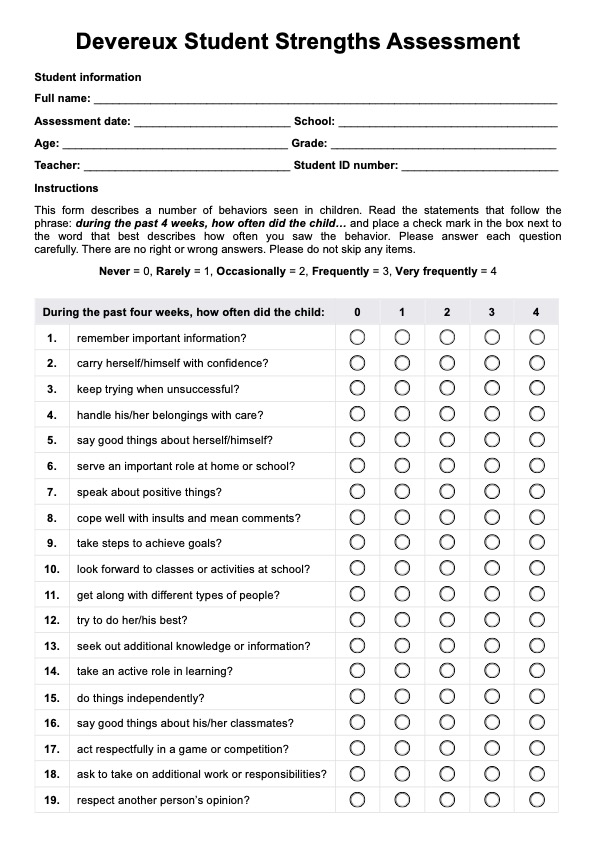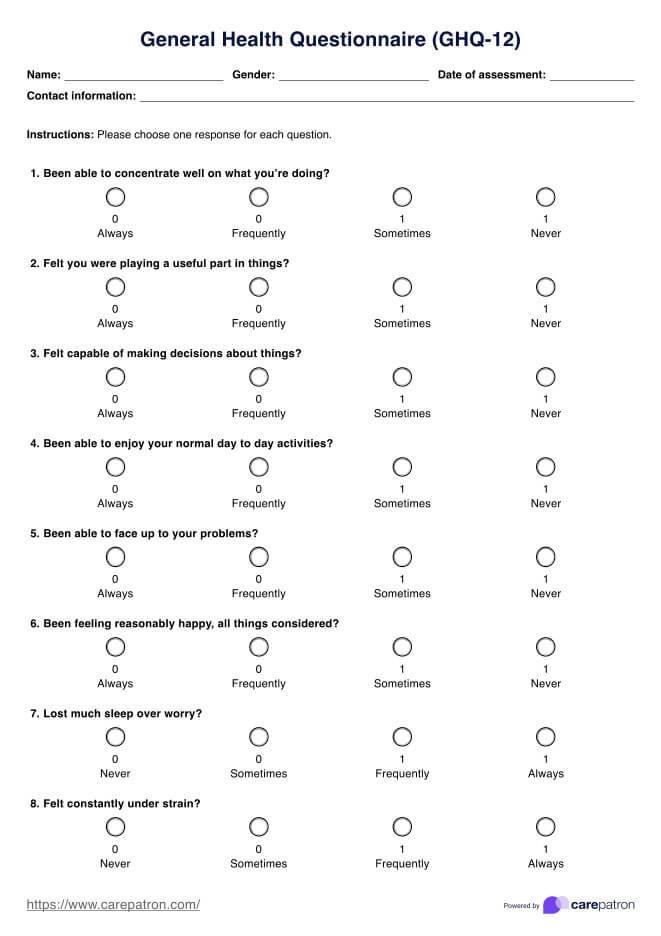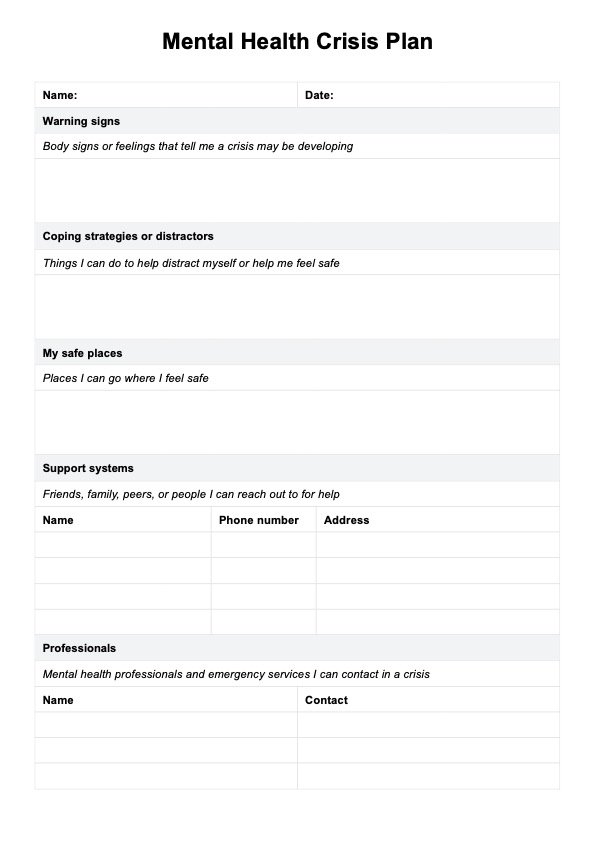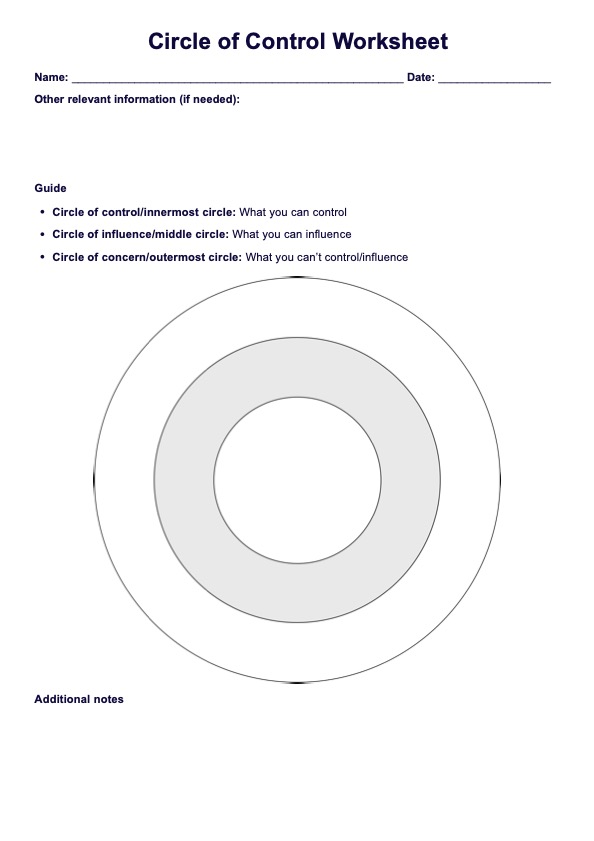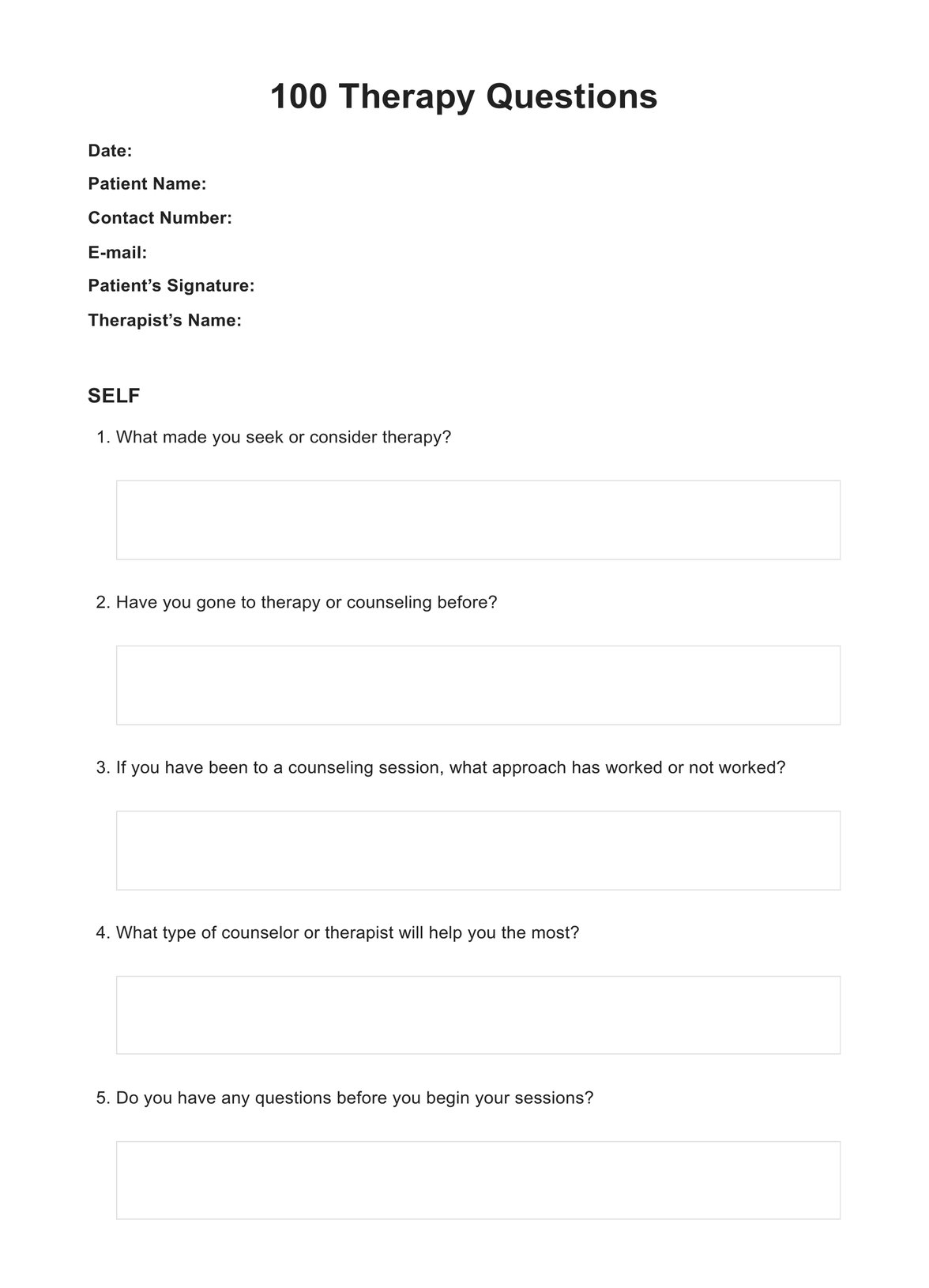Asperger's syndrome test
Gain insights into potential characteristics associated with our Asperger Syndrome Test in a user-friendly format. Start your journey of self-discovery.


What is Asperger's syndrome?
Asperger's syndrome, once considered a distinct diagnosis and now encompassed within the autism spectrum disorders, is a severe neurodevelopmental disorder and condition characterized by specific behavioral patterns and challenges in social interaction and communication. Individuals with Asperger's often exhibit intense interest in specific topics, displaying a deep and detailed knowledge.
Alongside these focused interests, they may engage in repetitive behaviors or adhere strictly to routines, often struggling to follow social rules. While language development is generally within typical ranges, individuals with Asperger's may struggle with the pragmatic aspects of language, such as understanding social cues, maintaining reciprocal conversations, or interpreting subtle nuances in communication.
The social challenges faced by those with Asperger's can manifest as difficulties in forming and sustaining relationships, as they may have trouble understanding social cues or navigating the unspoken rules of social interactions. However, it's crucial to recognize the individuality within the spectrum, as strengths and challenges vary widely.
Contemporary understanding and diagnostic criteria, now unified under the term autism spectrum disorder, emphasize the importance of recognizing and respecting the unique strengths and abilities of each individual while tailoring interventions and support strategies to address specific needs.
Asperger's syndrome test Template
Asperger's syndrome test Example
Similarities and differences between autism and ADHD
Autism spectrum disorder (ASD) and attention deficit hyperactivity disorder (ADHD) are both pervasive developmental disorders that can impact an individual's daily functioning. Still, they have distinct features that set them apart.
Similarities
Both ASD and ADHD share some similarities, particularly in the domain of executive functioning and experiencing some social difficulties. Challenges with administrative functions, such as attention, working memory, and impulse control, are observed in both conditions. Additionally, individuals with either ASD or ADHD might struggle with social interactions, though the nature of these difficulties differs. They may face challenges forming and maintaining friendships, understanding social cues, and regulating emotions.
Differences
One key distinction lies like social difficulties. Individuals with ASD often exhibit challenges in understanding social nuances, both nonverbal communication,-verbal communication, and reciprocity in relationships. On the other hand, individuals with ADHD typically struggle with impulsivity, hyperactivity, and difficulties sustaining attention, leading to challenges in task completion and organization.
Another notable difference between mental disorders is the presence of restricted and repetitive behaviors in ASD, such as intense interests, adherence to routines, or repetitive movements. Other issues for ASD include sensory issues, repetitive hand movements, struggles with holding eye contact, and restricted interests.
These behaviors are not characteristic of an ADHD diagnosis. In contrast, ADHD symptoms include restlessness (such as trouble sitting), impulsivity, and difficulty focusing, which are not core features of ASD.
Recognizing that these conditions can co-occur is crucial, and misdiagnoses may occur due to overlapping symptoms. A comprehensive assessment by qualified professionals is essential for accurate diagnosis and tailored interventions.
Asperger's diagnosis
The process of diagnosing Asperger's syndrome, now considered a part of the broader autism spectrum disorder (ASD), involves a comprehensive evaluation conducted by qualified healthcare professionals. Typically initiated by concerns raised by individuals, their families, teachers, or other caregivers, the diagnostic journey aims to understand and assess the individual's behavioral and developmental patterns.
The diagnostic process often begins with a thorough clinical interview, where the healthcare professional gathers information about the individual's developmental history, social interactions, communication abilities, and behavior patterns. Observations of the individual's social behaviors, interests, and responses to sensory stimuli are crucial components of the assessment.
Standardized tools and assessments, such as the Autism Diagnostic Interview-Revised (ADI-R) and the Autism Diagnostic Observation Schedule (ADOS), are commonly used to assist in the diagnostic process. These tools provide structured criteria to evaluate social communication skills, repetitive behaviors, and overall social and emotional functioning. Additionally, input from parents, teachers, or caregivers may be sought to comprehensively understand the individual's behaviors across different settings.
It's important to note that the criteria for diagnosing Asperger's syndrome have changed with the integration of ASD into a single diagnostic category. The focus is now on identifying the individual's strengths and challenges within the broader spectrum. A diagnosis is not solely based on deficits but also considers the individual's unique abilities and characteristics.
The diagnostic process aims to provide individuals and their families with a clear understanding of their cognitive and social profiles, facilitating access to appropriate support, interventions, and resources. Early diagnosis and intervention can significantly contribute to improved outcomes and a better quality of life for individuals within the autism spectrum.
Getting the correct diagnosis
Getting an accurate diagnosis for what was formerly referred to as Asperger's syndrome involves a thorough and multidisciplinary assessment, typically initiated when concerns about an individual's social and developmental behaviors arise. The diagnostic process is not confined to a specific age group and can be created at various life stages, including early childhood, adolescence, or adulthood.
For children, the diagnostic process often involves a collaborative effort among healthcare professionals, educators, and parents. It may include developmental screenings, behavioral observations, and assessments using standardized tools designed explicitly for autism spectrum disorder (ASD).
The Autism Diagnostic Observation Schedule (ADOS) and the Autism Diagnostic Interview-Revised (ADI-R) are examples of assessments that clinicians might use to evaluate social communication skills, repetitive behaviors, and overall social functioning.
In the case of adolescents and adults seeking a diagnosis, the process may involve retrospective evaluation of developmental history, behavioral patterns, and social interactions. It may also include self-reporting and interviews with family members or significant others who can provide insights into the individual's social and communication experiences.
Asperger's treatment
Individuals on the autism spectrum (ASD) have diverse needs and respond differently to various interventions. Therefore, there's no single "most successful" treatment for everyone. However, some common and evidence-based approaches can be quite helpful:
- Applied behavior analysis (ABA): ABA uses positive reinforcement and other techniques to improve communication, social skills, and other essential life skills. Starting ABA early in childhood can be particularly beneficial.
- Speech and language therapy: This can help individuals develop language skills, improve communication clarity, and learn social communication rules.
- Occupational therapy: OT helps individuals build skills for daily living tasks, sensory management, and motor coordination.
- Cognitive behavioral therapy (CBT): CBT can help manage anxiety, depression, and other co-occurring mental health conditions.
- Social skills training: This teaches individuals specific skills for social interaction, like starting conversations, understanding emotional cues, and maintaining friendships.
- Sensory Integration Therapy: This helps individuals manage sensory sensitivities and oversensitivities, which can be expected in ASD.
- Educational accommodations: Schools can provide individualized support and accommodations to help students with ASD learn effectively and reach their full potential.
- Family support and resources: Family members support individuals with ASD. Accessing therapy resources and support groups can be incredibly valuable.
- Medication: While not a core treatment for ASD, certain medications can be helpful for managing co-occurring conditions like anxiety, depression, or ADHD.
Research and evidence: the causes of Asperger's syndrome
Research into the causes of Asperger's syndrome underscores the complexity of its origins. While a definitive singular cause remains elusive, research suggests and points to a multifaceted interplay of genetic and non-genetic factors contributing to the development of ASD, including Asperger's. Genetic influences are integral, as certain gene variations have been identified with an increased susceptibility to the condition. This genetic component implies a complex interplay of inherited traits that may influence the manifestation of Asperger's.
Moreover, environmental factors during prenatal development are recognized as potential contributors to the etiology of Asperger's syndrome. Exposures to specific toxins or prenatal complications may act as environmental stressors, influencing neurodevelopment and contributing to the observed behavioral patterns associated with ASD. The intricate interplay between genetic and environmental factors during critical stages of fetal development adds layers of complexity to understanding the root causes of Asperger's.
The escalating global prevalence of ASD, including Asperger's, further highlights the urgency and significance of research endeavors in this field. As more individuals are diagnosed with Asperger's syndrome worldwide, comprehensive investigations aim to unravel the intricacies of the disorder, emphasizing the need for a holistic understanding of its multifactorial influences.
Co-occurring neuropsychological conditions often accompany Asperger's, underscoring the interconnectedness of various neurological and cognitive processes. This phenomenon necessitates a nuanced approach to research that considers the diverse manifestations of neurodevelopmental conditions.
Ongoing research efforts, as exemplified by studies such as those conducted by Motlani et al., are instrumental in advancing our comprehension of the causes of Asperger's syndrome. This research suggests ways in which we can contribute and add to the broader scientific understanding of ASD, paving the way for targeted interventions, improved diagnostic precision, and enhanced support strategies for individuals with Asperger's and related conditions (Motlani et al.).
Tips for parents of children With Asperger's
Parenting a child with Asperger's syndrome, or high-functioning autism, presents a distinctive journey marked by both unique challenges and profound rewards. Asperger's, characterized by difficulties in social interaction and communication and repetitive behaviors or intense interests, demands a thoughtful and tailored approach to parenting.
Understanding the developmental delays and problem behaviors that come with Asperger's disorder can make a smoother path for both the parent and the child. Navigating this journey requires a deep understanding of the disorder, as informed parenting decisions and strategies contribute significantly to a child's well-being.
To embark on this journey effectively, parents are encouraged to delve into educational resources about Asperger's syndrome. Equipping oneself with a comprehensive understanding of the intricacies of the disorder forms the bedrock of informed parenting. It empowers parents to navigate challenges effectively and fosters a profound connection with their children. The more parents comprehend the unique aspects of Asperger's, the better equipped they are to provide targeted support and encouragement.
Recognizing and celebrating the individuality of a child with Asperger's is pivotal. The disorder often comes with a distinctive set of strengths and interests. Tailoring parenting approaches to emphasize and nurture these strengths while addressing challenges is crucial.
By embracing and celebrating their child's unique qualities, parents create an environment that acknowledges differences and highlights the potential and capabilities inherent in Asperger's.
Clear communication is a cornerstone in parenting a child with Asperger's. Individuals with Asperger's may face challenges in social communication, necessitating a clear and straightforward approach. Parents can enhance communication by employing visual cues and establishing predictable routines. These measures facilitate effective communication and provide a sense of security and stability, which is particularly crucial for children with Asperger's.
Social skills development is a key aspect of parenting a child with Asperger's. Supporting the child in navigating social interactions, encouraging peer relationships, and offering explicit guidance on social cues can significantly contribute to their development. Implementing social skills training programs and therapies tailored to the child's needs becomes instrumental in fostering meaningful social connections and relationships.
Establishing a structured and predictable environment is paramount. Children with Asperger's often find comfort in routines. Defined schedules and visual cues provide a sense of security, reducing anxiety levels. This structured approach not only aids in day-to-day activities but also contributes to a positive and supportive atmosphere at home.
Gradually encouraging independence is another crucial aspect of effective parenting for a child with Asperger's. Allowing the child to take the lead in areas where they excel fosters a sense of competence and self-esteem. By recognizing and nurturing their abilities, parents contribute to the child's overall development and self-confidence.
Connecting with support networks is a valuable resource for parents of children with Asperger's. Local support groups, online communities, and professionals specializing in ASD offer insights, empathy, and practical advice. Establishing connections with other parents facing similar challenges creates a supportive community that understands the unique aspects of raising a child with Asperger's.
Flexibility in parenting approaches is essential, as Asperger's manifests uniquely in each child. Parents must be open to adapting strategies based on their child's evolving needs and developmental trajectory. This adaptability ensures that parenting remains attuned to the individual characteristics of the child with Asperger's.
Advocacy for the child is a paramount responsibility for parents. Being the child's best advocate involves close collaboration with educators, therapists, and healthcare professionals to ensure that the child's needs are recognized and effectively addressed in educational and social settings. This collaborative effort enhances the overall support system for the child.
Finally, prioritizing self-care is crucial for parents navigating the challenges of raising a child with Asperger's. Acknowledging the demanding nature of this parenting journey and taking intentional breaks to recharge ensures that parents can sustain the resilience and patience required for effective and supportive parenting. Self-care is not only an act of personal well-being but also an investment in the long-term success and happiness of both the parent and the child with Asperger's.
References
Motlani, Vidhi, et al. “Asperger Syndrome (AS): A Review Article.” Cureus, 11 Nov. 2022, https://doi.org/10.7759/cureus.31395. Accessed 14 Nov. 2022.
Commonly asked questions
No, ASD requires a comprehensive evaluation by qualified professionals, considering various genetic and environmental factors beyond a single test.
No, self-tests lack validity and can lead to misinterpretations. Seek professional evaluation for accurate diagnoses.
Self-diagnosis is not recommended. Consulting a doctor, psychologist, or other qualified professional is crucial for proper diagnosis and support.


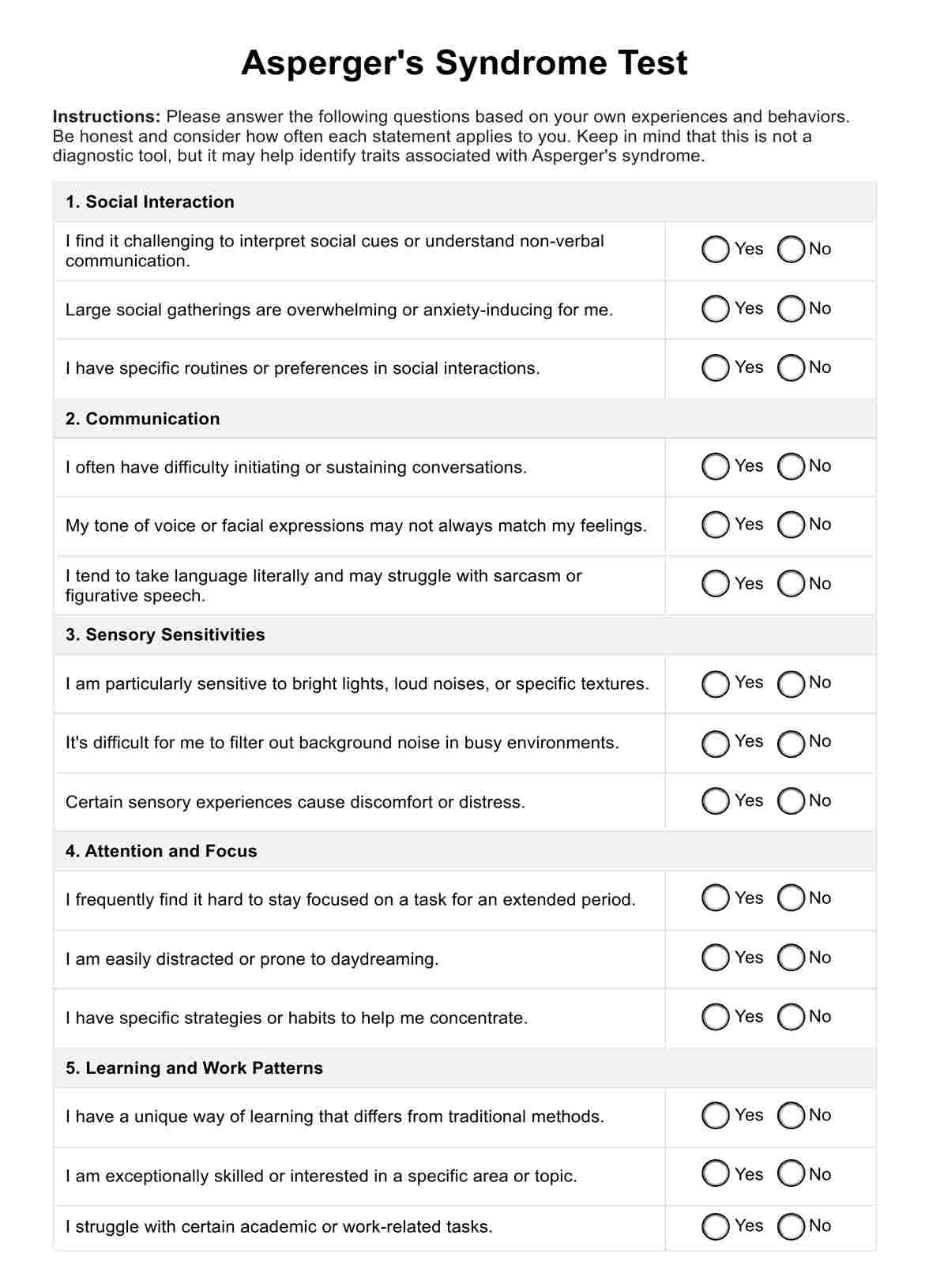
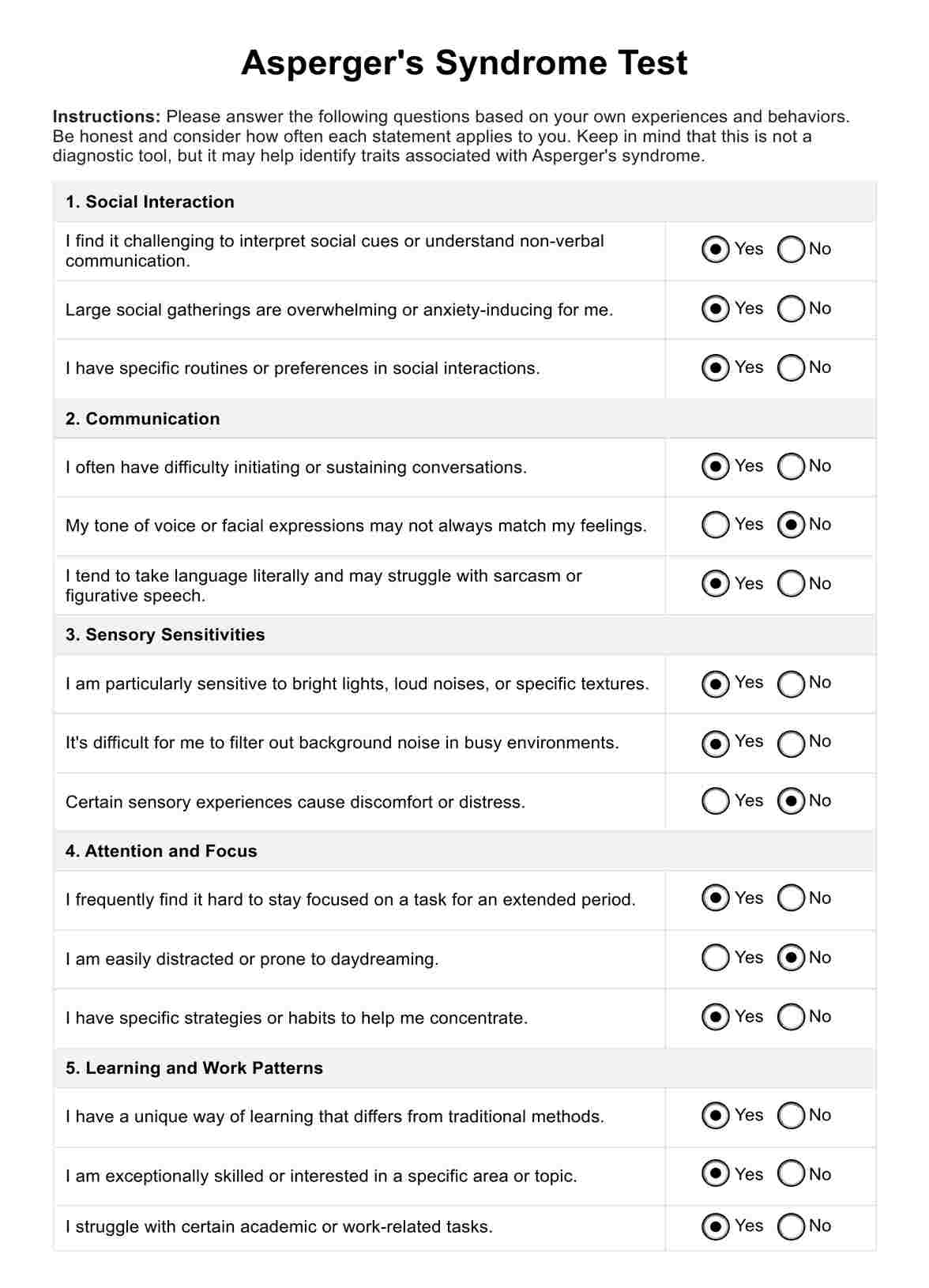
















-template.jpg)































